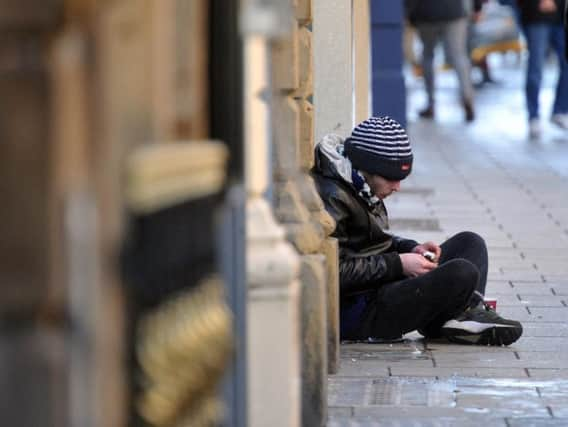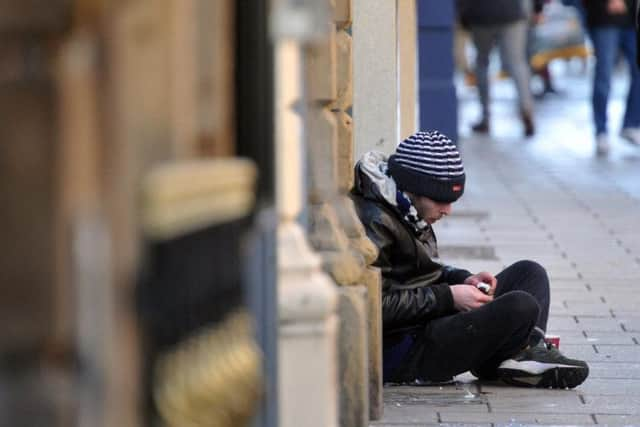Prime Minister urged to tackle "national scandal" of homeless deaths


The Museum of Homelessness (MoH) suggested the figure after it said its research found at least 235 people "affected by homelessness" had died in the last six months.
Advertisement
Hide AdAdvertisement
Hide AdThe social justice group used Freedom of Information requests, local authorities' figures, coroners' records and testimonies from families as well as details from media coverage to gather the data - but believe the true figure could be "significantly higher".


It has called for official bodies to better record homeless deaths, claiming the data so far registered by councils and health bodies is inconsistent.
Chris Wood, head of policy at housing charity Shelter, said the levels of homelessness in the country were a "national scandal", adding: "These deaths cannot be ignored and demand urgent action from the new prime minister.
"The new Government needs to increase housing benefit so it covers the true cost of renting, and tackle the root cause of the housing crisis by investing in three million more social homes over the next 20 years."
Advertisement
Hide AdAdvertisement
Hide AdIn Yorkshire, four homeless people died in the last six months, representing a drop compared with the last two years, when at least one homeless person was dying every month on average.
Eric Richardson, chief executive of West Yorkshire homelessness charity Simon on the Streets called for the Government to extend emergency funding for vulnerable rough sleepers for future years.
He said the £26m Rough Sleepers Initiative, which the Government announced last year, has been successful so far in helping tackle homelessness in areas like Leeds, Bradford and Kirklees but the funding runs out in March next year.
Mr Richardson said: "A positive point is that, certainly in the areas we work, the Rough Sleeper Initiative money has been well-spent. Our biggest concern would be when that grant finishes, what's going to happen then? Will we go back to the status quo of people not being picked up."
Advertisement
Hide AdAdvertisement
Hide AdHe added 12 months' funding for the project, which is administered by local councils and delivered in partnership with lots of local services, was probably not enough to help many of the people most at risk.
"When you're talking about entrenched rough sleepers, you're normally talking about a minimum of two, three plus years to try and do that work. We've got some people in Leeds who might have been sleeping rough for 10 or 15 years," he added.
MoH co-founder Jessica Turtle said in Yorkshire the number of homeless people who died could be much greater but the organisation relies on news coverage to track the deaths, which means they can slip under the radar. Three of the deaths occurred in Leeds, while one happened in Hull.
She said: "Leeds stands out -- it's definitely a hotspot if you like. I'd imagine that's because there's quite a high proportion of street homelessness."
Advertisement
Hide AdAdvertisement
Hide AdShe added: "We will continue to build a picture as we continue with the project. In some cases the data is not being recorded or there is a delay while inquests are resolved.
"The figures are very concerning."
More in news: Christa Ackroyd - Why the treatment of Lord Brittan has made me agree with Sir Cliff Richard
The people who died across the UK were aged between 16 and 104, and may have been in emergency or temporary accommodation or sleeping rough, the organisation said.
Working with the Bureau of Investigative Journalism, MoH has so far recorded the deaths of nearly 1,000 homeless people since 2017.
Advertisement
Hide AdAdvertisement
Hide AdThe Dying Homeless Project uses multiple sources to verify the details of each case.
Fellow co-founder Matt Turtle said: "We regularly hear from people who feel they're safer on the streets than in hostels and this data shows why.
"People are placed in inadequate, unsafe accommodation, whether badly-run hostels or other forms of private rented accommodation, with fatal consequences."
Advertisement
Hide AdAdvertisement
Hide AdThe organisation added that places where private rents were high correlated with areas where lots of people were sleeping rough.
A Ministry of Housing, Communities and Local Government spokesman said: "It is simply unacceptable that any life should be cut short due to homelessness.
"This Government is committed to ensuring everyone has a safe place to live.
"Councils are responsible for helping people at risk of being homeless so they can get the safety and support they need."